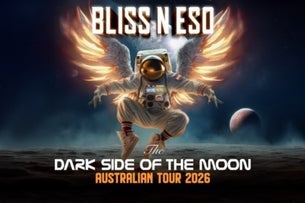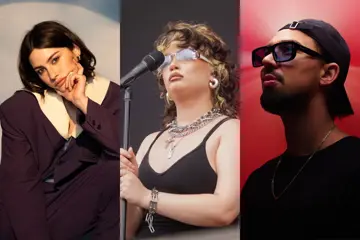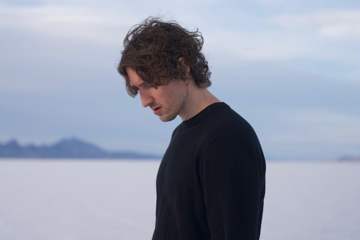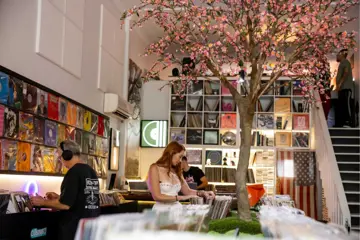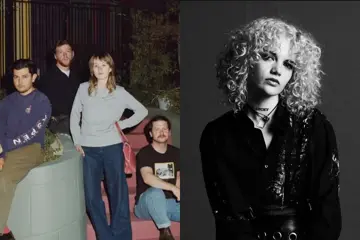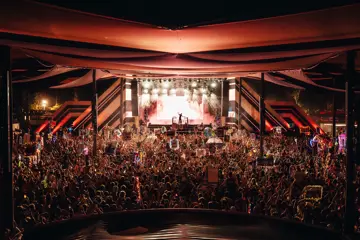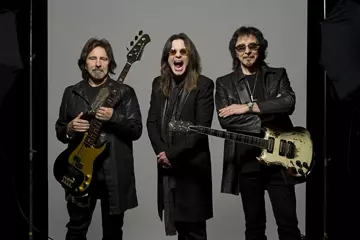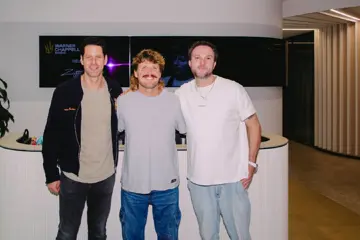 Bliss N Eso
Bliss N Eso"It's actually been a work in progress for quite a while,” Bliss understates of the workload that must have been necessary to result in their epic new album Circus In The Sky (currently set to drop on Friday 28 June). It's deep with texture, instrumentation, voices and concepts. It's ambitious yet grounded in the success of their past. He has ample reason to feel confident that the record will resonate with Bliss N Eso's legion of fans across the country.
“It's a fuckload of work, you know?” he laughs. “It's a lot of energy and a lot of emotion. There's ups and downs through the whole thing and there's times when you're not sure if you're doing the right thing. Sometimes you're on top of the world because you feel like you've nailed a verse or chorus or beat or whatever it is. Then when everything finally gels and comes together it's really exciting. I'm really stoked on this record and I really feel like it's a good step up for us and a really nice evolution for the group.”
Circus In The Sky was recorded over two years in Sydney, the Gold Coast, Melbourne and LA with Bliss once again taking on the role of the album's executive producer. For such an eclectic mix of tracks and sounds, the focus of the record is razor sharp.
“We had a pretty clear idea of where we were headed, at least over the last 18 months or so,” he asserts. “We just get a big whiteboard and we write down all our ideas and all our songs and potential songs so we have a kind of visual guide that we set out so we can see where the record is heading. I think it's very important to visualise things and that really helped to guide us in terms of what we felt we needed for colours and what we felt we needed for soundscapes and vibes. The key thing for us is that we like to have a lot of variety on the albums, and if you listen back to all of our albums it definitely takes the listener on a journey through a lot of different vibes, emotions, topics, themes – all that kind of stuff and that's kind of the crux of our record making I think so that was kind of an important part of this process. Just allowing us to see where we're headed before we get there.”
Don't miss a beat with our FREE daily newsletter
As usual, Bliss and his colleagues Eso (aka Max MacKinnon) and DJ Izm (aka Tarik Ejjamai) pay homage to hip hop's Golden Age while transcending these fundamental building blocks of hip hop and heading into new directions with modern sounds and little consideration for doing it any way other that the way they want to do it.
“I think a perfect example of that is Sunshine on the new record,” he says with unabashed excitement. “It opens up with like a classic 'boom bap' kind of beat, and you're listening to it and you're like, 'Damn! This is dope!' It's kind of like a Cypress Hill reminiscent thing and then suddenly it flips up into some down south Timbaland type vibe. I just love that juxtaposition of the old and the new because I think it's all relevant and I think it's important to keep creating and not just rehashing shit.”
For the first time on record Bliss N Eso document their early history in vivid detail on Circus In The Sky. Born in the States, Bliss arrived as a high school kid in Australia coming from a hip hop background, not knowing what these new surroundings would have in store for him.
“It was an absolute shock when I got here, it was like, 'Hold on a second! These guys don't know what the fuck's going on!'” he laughs loudly. “I came over and literally no one knew what the fuck was going down except Eso, so we just became friends. I talk about that on the tracks Home Is Where The Heart Is and Life's Midnight. I'm kinda happy we waited until now to tell these stories because it's a pretty amazing thing when you think about where hip hop was and where it is now in this country. It's completely different. Back then you'd go to a music store and you'd be lucky to find an Ice Cube or a Public Enemy record let alone a whole section. That was it and there was one store or maybe two stores in Sydney that would have some some hip hop or R&B stuff and that was it – the only outlet.”
Bliss tells how when they started tentatively making their own tunes, they didn't even consider whether there was anyone who might be interested in it, let alone anyone else actually doing it.
“When Eso and I started dabbling in writing our own rhymes and recording on boom boxes and cassettes we thought we were the only dudes in the entire country doing it, because that's what Australian culture was like,” he says bluntly. “Obviously we had to battle through all the criticism like, 'Oh, you're white kids doing black music' and we got made fun of all the time. For me, I got bullied because of my accent and I was immediately a misfit. It was a funny thing and it's pretty amazing to see the entire growth and to see where it's going. It really feels like it's a fully-fledged genre now, it's recognised by the industry and it's making massive waves and I don't see it slowing down, which is exciting.”
Paying no mind to critics with nothing serious to say, Bliss N Eso continued on due to their mutual love for the music. It would take quite some time before the guys realised that they weren't alone in Australia in harbouring dreams of doing what they wanted to do, but in the days before the internet it was hard to figure out where that was going.
“We recognised it straight away and didn't fall into the trap of peer pressure or any of that kind of stuff. I'm really happy we stuck with it though, some of those same people in high school that used to make fun of us ask for tickets for shows now,” Bliss laughs, “so it's a funny full circle thing.”
Referencing a track from the album which features this recollection, Bliss says he clearly remembers the exact moment that they realised they weren't alone.
“I actually talk about this in the song Life's Midnight,” he says. “The very first time we realised that we weren't alone was a documentary called Basic Equipment which came out in the late-'90s, it was on SBS I think. I still remember to this day Eso's mother calling me up and saying, 'Jonathan, turn on SBS right now!' I turned it on and my jaw was on the ground. I was, like, 'Oh my god, there's other people here doing this!' And back then it was just so amazing to see that there were other people doing it and that spurred us on even more. The universe had expanded suddenly. It just goes to show how disconnected and tiny the underground scene was. It wasn't like the artists on the documentary were selling lots of records or even had lots of records out. They were pressing them themselves and going around to stores themselves and doing consignment deals, just like how we started out.
“Eso and I are like ideas machines,” he continues, focussing on the future. “We have so many ideas, we're constantly thinking of stuff and as you go, the more you start realising your dreams and executing these ideas and actually doing it – figuring out how it works and keeping a positive frame of mind and really just staying on track with your ambitions. Once we realised the snowball was growing we knew we had to just keep rolling down the hill faster and building this thing up. The momentum gives birth to more momentum and success breeds success.”
While he's quick to acknowledge and accept the massive influence Bliss N Eso have had on the Australian hip hop scene, Bliss prefers to see the group as global up-and-comers as opposed to being elder statesmen of the local scene.
“Oh man, its fucking cool. It's just a dream me and my friend had and we stuck to our guns and we just happened to be one of the first crews to do it,” he says with genuine modesty. “It's great to be a part of the pioneers to set a bit of history there. But to be perfectly honest, I don't feel like we're the old dudes, man. I feel like this is just the tip of the iceberg and we got a long way to go and we got a lot of dreams and a lot of ideas. Australia is just a tiny little pond compared to the rest of the ocean of the world and there's still so much to do.”

